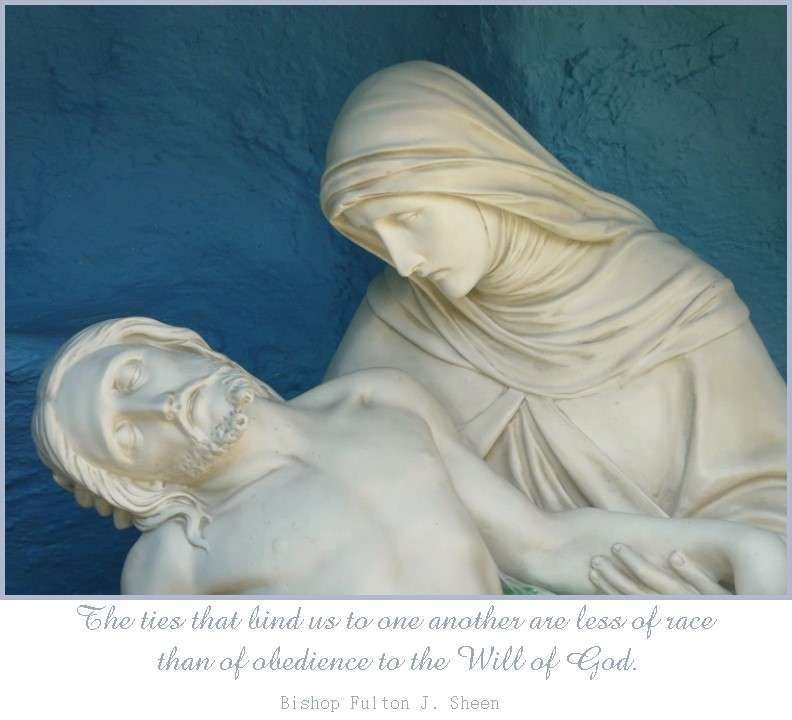
By f. Luis Casasús, General Superior of the Idente Missionaries,
Istanbul, November 04, 2018.
XXXI Sunday in Ordinary Time
(Book of Deuteronomy 6,2-6; Letter to the Hebrews 7,23-28; Saint Mark 12, 28b-34).
- What is love?
He whom love touches not walks in darkness. This is a sentence of Plato, the great Greek philosopher, but it could had been uttered by a true Catholic person.
It can never be overemphasized that we love because He first loved us (1 John 4:19).
This is the first thing to keep in mind, both for believers and non-believers, that, as Plato said, we are touched by love. Love comes to visit us. But those who do not have an intimate relationship with God will say, at most, that love is one of the most profound emotions known to human beings, which is the truth…but not all the truth. By no means.
Some thinkers speak of three forms of love: Eros, Philo and Agape; in his book Colours of Love (1973), J.A. Lee’s describes15 different love styles. But both philosophers and psychologists necessarily fall short in their efforts to understand the nature of love and they finish by saying that there is a kind of porosity between the seven types of love, which keep on seeping and passing into one another. Why this is so? Probably because they are based on an individualistic approach.
But there has been some criticism from brilliant intellectuals:
* Erich Fromm, in his classic The Art of Loving (1956), considers love to be an interpersonal and creative capacity of humans rather than an emotion. He emphasizes that genuine love involves concern for the other and the desire to satisfy their needs rather than one’s own.
* M. Scott Peck, in The Road Less Traveled (1978) taught that love is an activity or investment rather than a feeling. He contrasts his own views on the nature of love against a number of common misconceptions about love, including that love is identified with a romantic experience, solely relying on feeling in love.
But we can and we should go further, as today’s Gospel text tells us, love is the essence of life and the essence of God himself. In fact, the Ten Commandments are divided into two groups, the first four dealing with how to love God and the last six with how to love your neighbor as yourself. Yes, you cannot break the laws of God…you break yourself against them. It will not work. You jump off a skyscraper and you do not break the law of gravitation. You break your neck, but not the law of gravitation. This is why, with the prophet Hosea, we can contemplate God as a Father who guides our steps, not as a judge:
For the ways of the Lord are right, and the upright walk in them, but transgressors stumble in them.
Both for our spiritual and apostolic life, it is important to understand that there is more than a “porosity” between natural love and true charity, the love of Christ:
If the Christian lost sanctifying grace due to mortal sin, faith would be reduced to belief; hope to expectation; charity to love. Whoever misfortunately commits a grave sin loses charity but not love, hope but not expectation, faith but not belief. The constitutive virtues -belief, expectation, love- are dispositionals of their corresponding theological virtues acquired through sanctifying grace. (Fernando Rielo, Humanism of Christ)
In saying that the love of God is the first and loving our neighbors as the second, Jesus was not speaking of specific laws. He was both talking about our nature and laying down a practical principle to be applied in every situation.
True love is grasped only by the person who loves. If you know that God loves you, but you do not implement His Love in your life, it is like someone who studies water without drinking it. My understanding of water does not quench my thirst. I don’t need knowledge about water, I need to drink water.
Viewed as a commandment, as a law, love is not prohibitive and restrictive by requiring us to do the minimum. It tells us that we can always love more. Love (like faith and hope) is limitless, it does not know boundaries. This explains why we need the gifts of the Holy Spirit to progress in charity, to go from tolerance to communion, because we do not have the capacity to love as He has loved us.
In a park, you might find a sign saying one of these messages:
1- Picking flowers is prohibited.
- Please do not pick the flowers.
3- Those who love flowers will not pick them.
Only the last one goes beyond fear or desire of approval. Our true motivation for every action can only be love and God is only attained through the total gift of self to our neighbor. If we lose the spirit of the laws, which is based on the love of God and His love for us, we become more preoccupied in obeying the laws slavishly than seeing the beauty of the laws. When that happens, instead of being our ally, the laws become our enemies.
- The power of love. Only with a love experience we can radically change our lives. Sometimes this is a long process, sometimes this is… instantaneous.
The ability to have healthy, loving relationships begins in infancy, in a child’s earliest experiences with parents who reliably meets the infant’s needs. Those relationships appear to establish patterns of relating to others. Our capacity for human love depends so much on how our parents love us unconditionally since they planted that seed of love in us. Our self-centeredness can also be healed by the testimony and the innocence of someone with a life very close to God.
One day, a holy man asked his disciples: When do you know that the night has ended and the day has begun? One student answered: When you look in the distance and can distinguish between a fig tree and a palm tree. Another said: When you look in the distance and can distinguish between a dog and a sheep. And others gave similar answers. But the holy man rejected each of these. Finally, his students asked: When do we know that the night has ended and the day has begun? And the holy man answered: When we look in the distance, and see no difference between our enemy and our friend – we look at both each and every person with love, then we know that the night has ended and the day has begun.
Do not make God an accomplice of your feelings,
for He is not just one ballad that you alone sing.
No.
Do not doubt it.
God resides more in your neighbor’s heart
than in your own (Fernando Rielo, Transfigurations).
Why is it that people come to faith in Christ? Is it because someone’s brilliant arguments have convinced them of the truth? It might help, for sure. But most often, it is because they experience God’s love when God’s people project that love to them.
A missionary had a life-changing experience when he visited a leper colony in South America. He would visit the people, pray with them, sing with them, read scripture to patients. Met a woman named Rose. Her eyes had rotted away, leaving her blind. Her hands and feet were only stumps. There was blood on her face from mosquitoes biting her, because she could not swat them away. Yet, when the missionary was getting ready to pray for her, and he asked what she would like, she asked him to pray that God would help her show the doctors that Christ was alive in her life. She wanted the doctors to know God’s grace. Her concern was not for her own health and comfort. Her real passion was the love of God.
When Saint Mary Magdalene washed the feet of Jesus with her tears and wiped them with her hair, He said: You always the poor among you, but you won’t always have me. Christ’s words echo the words of Deuteronomy (15:10, 11): Give generously to the poor, not grudgingly, for the Lord your God will bless you in everything you do. There will always be poor in the land. That is why I am commanding you to share freely with the poor. Mercy and generosity is a lifestyle not a project. We help those in need not because we think we will end poverty but because that is the kind of people God calls us to be. We share because of who we are.
Worldly forms of love are really emotional attachments and whose limitations will soon become apparent:
A young man received this message from an ex-girlfriend: Dearest John, no words could ever express the great unhappiness I’ve felt since breaking our engagement. Please say you’ll take me back. No one could ever take your place in my heart, so please forgive me. I do really love you. Yours forever, Beatrice.
P.S. And congratulations on winning the First Prize of the National Lottery.
How many false loves
as opposed to one that is true (Fernando Rielo, Transfigurations).
- Charity in practice. In our Ascetical Examination, after reviewing our faults against charity, we declare if we have seized all available opportunities to transmit the Gospel and vice versa, if we have turned every moment into an opportunity to witness the presence of the Most Holy Trinity. This is the Apostolic Vow which, along with the Vow of Cathedra, represent the more exquisite possible way of practicing charity for an idente missionary. As announced in the First Reading, the Holy Spirit will make our efforts fruitful when and how He wishes: The God of your fathers will give you a land flowing with milk and honey.
In the midst of the battle of daily life, how often do we forget the purpose of our mission, which is ultimately to bring others to Christ by inviting them to a life of holiness. We should not forget that to allow others to do good is to prepare their hearts to receive the grace of conversion:
Saint Martin of Tours was a Roman soldier and still seeking the true faith. One day, he met a man in the freezing cold without clothes begging for alms. He took pity on him, cut his coat in two and gave half to the stranger. That same night he dreamt of Jesus appearing with a torn cloak. When one of the angels asked him: Master, why do you wear that battered cloak? Jesus replied: My servant Martin gave it to me. After this vision, Martin got baptized immediately.
There is no genuine holiness apart from the mission to care for the spiritual and material good of others. St. Teresa of Avila says that the surest way that we know we are loving God is when we love our neighbors: We cannot be sure if we are loving God, although we may have good reasons for believing that we are, but we can know quite well if we are loving our neighbor.
Many understand love
to be a way of renting their neighbor (Fernando Rielo, Transfigurations).
Tips to make the most of the Holy Mass
- The Concluding Rites. To bring to completion the prayer of the People of God, and also to conclude the whole Communion Rite, the Priest pronounces the Prayer after Communion, in which he prays for the fruits of the mystery just celebrated.
To the Concluding Rites belong the following:
- a) brief announcements, should they be necessary;
- b) the Priest’s Greeting and Blessing,
- c) the Dismissal of the people by the Deacon or the Priest, so that each may go back to doing good works, praising and blessing God;
- d) the kissing of the altar by the Priest and the Deacon, followed by a profound bow to the altar by the Priest, the Deacon, and the other ministers.
Go forth, the Mass is ended.
Or: Go and announce the Gospel of the Lord.
Or: Go in peace, glorifying the Lord by your life.
Or: Go in peace.
Each of these commands to go in peace is not intended to maintain the peace of Christ in our own hearts for our personal benefit. Rather, having participated in the whole Mass, we are to take what we have received in word and sacrament and bring it to the world so that the peace of Christ may abound. This is most clearly expressed in the Prayer After Communion for one of the Sundays in Ordinary Time which says:
Lord, bring to perfection within us the communion we share in this sacrament.
May our celebration have an effect in our lives.
Because Christ’s real presence in the consecrated Bread doesn’t end with the Mass, the Eucharist is kept in the Tabernacle for Communion to be taken to the sick and for silent adoration in the Most Blessed Sacrament; Eucharistic worship outside of the Mass, be it in a private or communal way, helps us in fact to remain in Christ.
Therefore, the fruits of the Mass are destined to mature in everyday life. In truth, enhancing our union with Christ, the Eucharist updates the grace that the Spirit gave us in Baptism and in Confirmation so that our Christian witness is credible.
Finally, to take part in the Eucharist commits us in our relations with others, especially the poor, educating us to pass from the flesh of Christ to the flesh of brethren, in which He waits to be recognized, served, honored and loved by us. Bearing the treasure of union with Christ in earthen vessels we have constant need to return to the holy altar until we enjoy fully in Paradise the beatitude of the wedding banquet of the Lamb.










